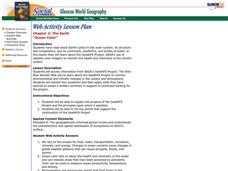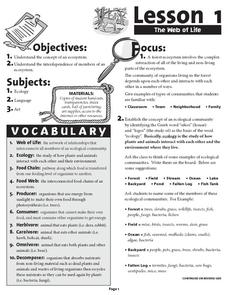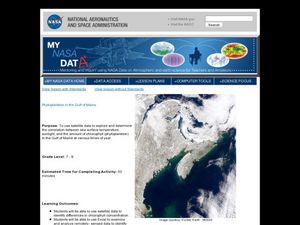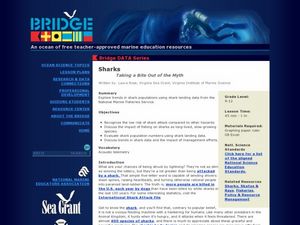Curated OER
Reef Sharks!
Young scholars visit an ocean aquarium exhibit where they can observe Black tip reef sharks. They observe the shark's behavior and read any information exhibited on the walls. They complete a worksheet based on information collected.
Science Matters
That’s An Otter Story
Young scientists discover how sea otters' habitats have changed due to human impact. Through conversation, video observation, and story reading, scholars identify how human interactions change a specific ecosystem in both positive and...
Curated OER
Feeding in the Flow
The National Oceanic and Atmospheric Administration (NOAA) has developed a tremendous library of ocean-themed lessons that can be used in a variety of science settings. "Feeding in the Flow" is one of those activities; Its focus is on...
Curated OER
Plankton / Phytoplankton
Students discuss the importance of plankton in the ocean ecosystem. In this biology lesson, students identify the different types plankton by observing them under the microscope. They explain how plankton population affect global climate.
Curated OER
Hawaii's Freshwater Animals - Species Report
Students explore biology by creating a report for the class. In this oceanography lesson, students research and identify the survival characteristics of a list of freshwater animals by utilizing the Internet and library. Students...
Curated OER
Coral Reefs Endangered
Young scholars research where in the world coral reefs are located. In this ecology lesson, students create food chains and food web. They simulate growing coral reefs to understand their characteristics better.
Curated OER
Sea Connections
Students, after locating different marine habitats on a globe, play a card game about ecosystems, food webs and organisms.
NOAA
What's the Difference?
Due to the isolation of seamounts, their biodiversity offers a great deal of information on the development of biological and physical processes. Pupils use simple cluster analysis to rate the similarity and differences in biological...
Curated OER
Camouflage, Protection, & Adaptations—Who am I?
Students explore ocean animal adaptations. In this animal adaptations lesson, students examine how different ocean animals use adaptations other than camouflage to protect themselves.
Curated OER
The Living Environment
Fourth graders make a chart of animals and plants that live in either the desert, the ocean, or the tundra. For this environment lesson plan, 4th graders work in groups to discover characteristics needed for these animals to live in that...
Curated OER
Ocean Color
Students examine NASA's SeaWiFS Project Web site to explore how the SeaWiFS Project monitors environmental and climatic changes in the oceans and atmosphere. They answer questions and write a summary in support of continued funding for...
Curated OER
The Web of Life
Students participate in a game in which they discover the balance of life in the ocean. They identify different organisms that rely on different types of food. They answer questions to complete the lesson.
Curated OER
Head to Foot
Students describe the body form and major anatomical structures of squids and describe some unusual or unique features of newly-discovered deep water squid species. They infer what types of food squids use from their anatomical features.
Curated OER
Sinking Races
Students build plankton models and compete to see which sinks most slowly. They write, or orally present ,the adaptations they incorporated to slow the sinking rate of their organisms. Race results can be grounds for some prizes!
Forest Foundation
The Web of Life
Producers, herbivores, carnivores, omnivores, decomposers. To begin a study of the forest ecosystem, learners examine the connections among the members of ecological communities.
Curated OER
Fish Communities in the Hudson
Learning to read data tables is an important skill. Use this resource for your third, fourth, or fifth graders. Learners will will study tables of fish collection data to draw conclusions. The data is based on fish environments in the...
Curated OER
Phytoplankton in the Gulf of Maine
Students use satellite data to see the correlation between sea temperature and sunlight in the Gulf of Maine. In this phytoplankton lesson students use Excel to analyze data.
Curated OER
Visual Vocabulary
Students interpret and name the vocabulary termed acted out by the mime. In this science/language arts/physical education activity, students are given a set of vocabulary terms to discuss within their group. Next, students place all...
Curated OER
Empty Oceans
In groups of four, pupils brainstorm about seafood. They view the Monterey Bay Aquarium Seafood Watch website to examine the problems caused by the seafood industry. Learners are then brought back together to discuss what they...
Curated OER
Whales
First graders investigate two different types of whales; toothed and baleen. They describe what the different types of whale eat. They listen to a cassette of Dyan Sheldon's, The Whale Song before making stick puppets to dramatize the...
Curated OER
Sharks ~ Taking a Bite Out of the Myth
The first thing to know about this lesson is that the commercial fisheries data for the activity no longer seems to be available. That being said, there are fascinating links to other websites, some about the comparative odds of being...
Curated OER
Out of the Deep
Students observe, describe, and record characteristics of ocean animals (mammals and fish) and sea shells. They conduct an experiment comparing and contrasting sugar water, salt water and fresh water and create a mural of coral reef...
Curated OER
Phytoplankton
In this phytoplankton instructional activity, students read and study online information on plankton blooms to answer 8 short answer questions about the topic.
Curated OER
The Future of Arctic Sea Ice
Students research about the importance of sea ice to world climate and sea organisms. In this earth science lesson, students create a model of present and future Arctic sea ice communities. They discuss how ice melting affects...

























